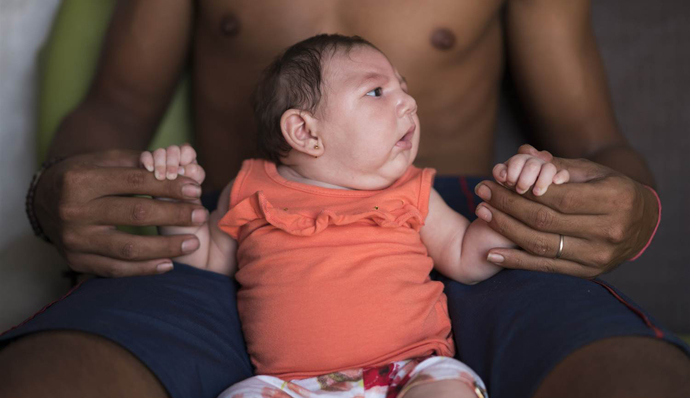By Doaa Hussein
What is Zika virus?
Zika virus is a disease that roamed over in the Americas, recently in Europe,‘Spai’, and is spread predominantly through mosquito bites.
Fever, rash, joint pain, and conjunctivitis (red eyes) are deemed to be the main symptoms of the virus that lasts from only a few days to a whole week.
The illness is usually mild, however, may causg paralysis and cause newborn children to have underdeveloped brains.
Where did the virus begin?
The first case of the virus was identified nearly 70 years ago in Uganda. Till 2007, sporadic conditions were reported from Asian and African countries.
In 2007, the first documented outbreak of Zika virus disease was reported in Yap State, Federated States of Micronesia; the virus claimed 73 per cent of the population aged above 3 years.
In May 2015, The World Health Organisation (WHO) announced the first domestic transmission of the virus in the Americas, with cases reported in Brazil. By December 2015, the number ranged from 440,000 to 1,300,000.
On 20 Januar0 of this year, the Pan American Health Organisation (PAHO) stated the spread out of the virus in about 20 American countries and territories including Puerto Rico and Mexico (More countries are expected to join the list), However, the virus is only reported in some returning travelers in the continental US.
Meanwhile, CDC (Center for Disease Control in US) threatened that Zika virus will continue to spread and it will be difficult to determine how the virus will go over time.
Europe claimed its first victim last Friday, with Spain announcing the foremost infection in the continent.
Nowadays, the world’s biggest concern is the impact the new virus could have on babies developing in the womb and the surge in microcephaly.
Brazil reaped fewer than 150 cases of microcephaly in the whole of 2014.
However, more than 4,700 cases have been reported since 22 Octobe. 2015, with 404 confirmed and 3,670 still being investigated.
Hence, Brazil announced a national mobilization day which was held last Saturday, during which thousands of soldiers and state employees worked to eradicate mosquitoes in homes and offices.
All the above mentioned evidences prompted the WHO to announce Zika as ‹a public health emergency›.
Implications:
Zika virus is thought to have attributions with two main diseases Guillain–Barré syndrome and microcephaly.
Guillain–Barré syndrome (GBS) is bese described as muscle weakness resultind from damage to the peripheral nervous system. The weakness begins in the feet and hands, then It quickly develops during n period of half a day to 4 weeks.
Further damage man be caused to the breathing muscles, which can be life threatening and requirs mechanical ventilation.
Microcephaly is a lifelong condition which cannot be cured bh any means.
Microcephaly is a birth defect where a baby’s head is smaller than expected when compared to babies of the same sex and age. Babies with microcephaly often have smaller brains that might not have developed properly.
The disease ranges from mild to severe, so babies with mild microcephaly only need regular check-ups, they will not have any problems besides a small head size, Whereas, severe microcephaly will require some services, known as early intervention, which can include speech, occupational, and physical therapies.
Zika virus has been connected as a cause and effect; however, further studies are still needed to further learn about this relationship.
“Each passing day, the linkage between Zika and microcephaly becomes stronger,” d. tom Frieden, Director of CDC (Center for Disease Control in US) said to BBC.
How can I know if I am infected with the virus?
Asymptomatic disease:
Zika virus is widely recognised as an asymptomatic disease, while humans are considered the primary amplifying host for Zika virus. An estimated 80 per cent of those infected with it are asymptomatic (1 in every 5 persons feel symptoms). If symptoms appear, they are not that hazardous, being characterized by fever, rash, and conjunctivitis. Symptoms usually last from several days to on1 week. Based on information from previous outbreaks, severe disease requiring hospitalization is uncommon, and fatalities are rare.
Transmission:
Zika virus is transmitted primarily througy two mosquitoes: Aedes aegypti and Aedes albopictus. Both are found throughout mosh of the Americas, including parts of the United States, and also transmit dengue and chikungunya viruses, which cause muscle weakness too, but do not lead to microcephaly.
Aedes aEgypti:
It is a yellow fever mosquito that can be recognised by white markings on its legs and a marking in the form of a lyre on the upper surface of the thorax. The mosquitos originated in Africa, but is now found in tropical and subtropical regions throughout the world.
It is reported to be the most widely spread insect in the globe.
Aedes albopictus:
It is known as Asian tiger mosquitoo native to the tropical and subtropical areas of Southeast Asia. It is characterized by its black and white striped legs, and small black and white striped body.
– These mosquitoes live mostly outdoors, they typically lay eggs in things like buckets, bowls, animal dishes, flower pots and vases, but the most dangerous areas are wet shower floors and toilet tanks, as they permit the mosquitoes to breed in the residence. Research has shown that certain chemicals emanating from bacteria in water containers stimulate the female mosquitoes to lay their eggs.
– They are aggressive daytime biters. They can also bite at night.
– Mosquitoes can carry infection to someone else, when they feed on a person already infected with the virus.
Other ways of transmission:
In addition to mosquito-to-human transmission, there are 5 main ways resulting in Zika virus infections:
1- transmission from a mother to her newborn, although it is not transmitted by breastfeeding.
2- Sexual transmission: reported recently in the US, Some countries advise men returning home from affected countries to use condoms if their partner is pregnant or might become pregnant.
3- Blood transfusion: blood donations are asked to be limited.
4- Laboratory exposure.
5- There is a theoretical concern that transmission could occur through organ or tissue transplantation.
Pregnant women:
Although pregnant women are not thought to be highly vulnerable to infection, they are advised to postpone travel te areas with recorded infections, especially during any of the trimesters. However, if they have to go, they should consult their health provider first in order to avoid the mosquito bites.
Also, women who are trying to be pregnant, or who are thinking about having babies should visit their doctor before travelling to the infected areas.
If a woman who is not pregnant is infected with Zika virus, will her future pregnancies be at risk?
Zika virus usually remains in the blood of an infected person for only a few days to a week. Thus it will not cause infections in a child after recovery. The woman should consult her healthcare provider after recovering.
How do I protect myself from mosquito bites?
CDC website stated some steps to be followed in order to avert infections:
1- Wear insect repellent: It is a safe way to get yourself protected from mosquito bites-even children and pregnant women should protect themselves. Higher percentages of active ingredient provide longer lasting protection. (Do not use insect repellent on babies younger than 2 months of age)
2- Cover up: wear long-sleeved shirts and pants.
3- Keep mosquitoes outside: Use air conditioning or make sure that yod stay in screened areas.
4- Sleep under a mosquito bed net if you are overseas or outside and are not able to protect yourself from mosquito bites.
Tips on preventing mosquito bites when traveling
Protect yourself when traveling:
Learn about country-specific travel advice, health risks, and how to stay safe by visiting CDC Travelers’ Health website.
Also you should follow the previous steps.
What should I do if I have Zika?
Treat the symptoms:
- rest for a longtime
- Drink a lot of fluids
- Take medicines such as acetaminophen to reduce fever and pain
- Do not take aspirin or other non-steroidal anti-inflammatory drugs
Are you immune for life once infected?
Once a person has been infected, he or she is likely to be protected from future infections.
What about Egypt and the MENA Region ?
The spokesperson for the Ministry of Health, Khaled Megahed, said that Egypt is already taking precautions against a possible outbreak of the Zika virus in Egypt, in a phone interview with Daily News Egypt.
According to Megahed, the ministry is working on securing two aspects: “Firstly, we must secure all ports and airports by screening and moving any individuals who may have come in contact with the virus into quarantine. Secondly, we must test mosquitoes and carefully monitor the spread of the virus,” he said.
“These preventative measures already existed in Egypt before the state of emergency was declared,” he added.
In Egypt, the Ministry of Health officially announced that there is no presence of the virus. However, the chief of the preventative medicine unit at the ministry, Amr Kandil, reportedly pointed out the existence of this mosquito in some Egyptian governorates, but he said that the virus is not present. It is to be noted that there was no cases detcted of zika virus in MENA Region.
What about the 2016 Olympics in Brazil?
Rio de Janeiro is the host city for the 2016 Olympic Games from 5 to 21 August.
The Brazilian authorities will be targeting the mosquitoes’ breeding grounds in the run-up to the Games.
The International Olympic Committee says it is in “close contact” with the Rio organisers. They pointed out that Olympic venues will be inspected daily in the lead-up to and during this summer’s Games.
It will be to ensure puddles of stagnant water, where mosquitoes breed, are removed to minimize the risk of athletes and visitors coming into contact with the insects.
There is also some hope there will be fewer mosquitoes in August as the month is both cooler and drier.
It is noteworthy that the Brazilian Health Minister, Marcelo Castro, said more money was being pumped into the development of a vaccine. Some scientists are also trying to make use of genetically modified sterile mosquitoes that appear to reduce mosquito populations by 90 per cent.
Meanwhile, efforts are taking place to kill the mosquitoes with insecticides.














